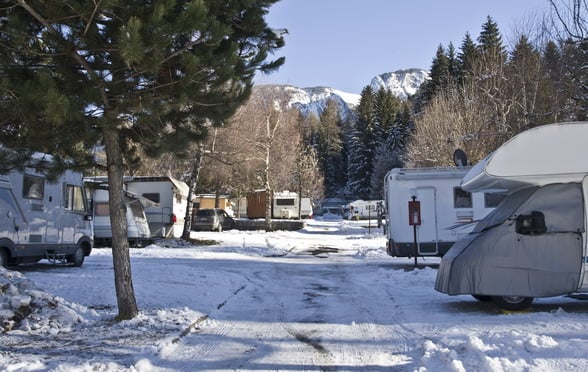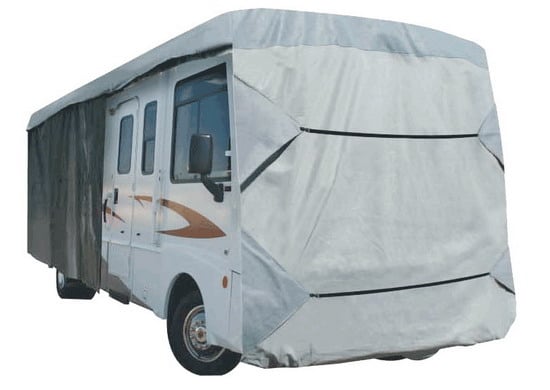With summer now in bloom across most of the country, America’s RV and travel trailer owners are out on the roads in full force. Most are not even thinking about what they plan to do when it comes time to store their rigs in the fall. Nonetheless, now is the time to start thinking about if you should cover your RV in the winter, especially if you plan to use an RV or trailer cover.
There is plenty of debate over whether or not to use recreational vehicles (RV) and travel trailer covers. Those against the practice site numerous problems including moisture damage, mold, damaged finishes, and bent framing. Those in favor of covers will insist they have never had a problem. So here’s the question: should you cover your RV or trailer, or should you leave it to the elements over the winter?
Reasons to Cover RV or Travel Trailer
We believe covering your rig is the better option. Here are four reasons why you should cover your RV or travel trailer:
1. Sun Damage
The roof on your RV is certainly not as durable as the one on your home. Constant exposure to the sun wears down the roof material, ultimately drying out the caulking used to seal vents and air conditioning units. While a cover does not provide 100% protection, it can cover can significantly slow down sun damage.
2. Moisture Potential
Moisture is the enemy of the typical RV or travel trailer. Water can pool on the roof due to sags or dimples, or it can be collected and absorbed by pine needles, leaves, grass, and other sorts of debris. During the hot summer months, this is usually not a problem. However, during the fall and winter, any moisture on the roof may not evaporate. This can lead to mold and mildew come spring.

3. Snow Damage
RV owners that live in northern environments have to think long and hard about the snow. Just a couple of inches of accumulated snow on your rig could cause pretty significant damage. It is especially problematic if you have a couple of quick thaw/freeze cycles during the season.
4. Window Seals
A good RV trailer cover will be large enough to cover all of your windows as well. Keeping them covered during the off-season protects the seals around the windows from dry rot and thaw/freeze cycles. You will get longer life from your seals and caulking.
We should note that we favor covering your rig with a specially designed cover that fits well. We do not endorse the use of generic poly tarps. Why? Because tarps and improperly fitting covers can cause more problems than they solve.
Tips for Using Covers Properly

Any type of cover you use for your RV or travel trailer has the potential to damage the vehicle if not used properly. Here is what you need to know about using travel trailer covers properly:
Sizing
You need to choose a cover for your rig that matches its size. Covers need to fit snugly in order to keep out moisture, bugs, and debris. Your cover should be large enough to protect the entire unit, from top to bottom, but not so large that it moves freely in the wind.
RV-cover
The most important thing you can do to protect your rig is to make sure the cover is tightly secured. If the cover is not tight, it can cause damage by flapping in the wind, allowing moisture underneath, and even allowing precipitation to pool in various locations. This is a good way to damage your RV or trailer.
When a cover is sized appropriately and used properly, it offers you maximum protection for your RV or travel trailer. A good quality cover from Mytee Products is an excellent investment that will extend the life of your rig.









